WHAT IS AGRITOURISM?
What is agritourism?
Agritourism is a type of tourism where tourists (known as ‘visitors’ or ‘guests’) experience a taste of farm life on their holiday.
In NSW’s Planning Legislation, agritourism is defined as ‘on-farm’ experiences, that is, on land categorised as farmland by Council or a commercial farm (a primary production business under Commonwealth tax legislation, i.e. not a hobby farm).
Only certain kinds of activities are permitted on farms by the state’s planning legislation:
Under the Legislation, agritourism businesses must only supplement and be secondary to the agricultural use of the land. They must not detract from the farming or become the more dominant activity.
Guide: Read a simple guide to understanding the legislation: A guide to agritourism approvals by NSW Planning
Examples of agritourism in Cootamundra-Gundagai
Other examples of on-farm agritourism experiences include
- Roadside stalls
- Pick your own produce events and experiences (e.g. open on weekends during the harvest season)
- Farm demonstrations
- Meal events, particularly ones that showcase local produce
- Local produce cooking demonstrations or classes
- Business events, such as teambuilding activities and meetings
- Educational experiences for school groups
Guide: Five types of agritourism experiences you can offer on your farm by NSW Planning.
Other types of ‘agritourism’ experiences
From a tourism perspective (rather than a planning perspective), experiences that are not on farms can also be called agritourism if they connect visitors to local farming practices, such as buying local produce at a farmers’ market, or enjoying local produce in cafes and restaurants.
In the planning legislation there are other types of developments that may be permitted on your Land Use Zone that are not defined as agritourism, but from a tourism perspective would be classed as agritourism, that is, if they connect visitors with local farming or food production.
Examples include
- Artisan food and drink industry – manufacture of artisan food and drink products with retail areas for sales, and/or food preparation and sales to eat on site or takeaway with or without entertainment, and/or tastings, tours or workshops.
- Backpackers accommodation – dormitory style with communal bathroom, kitchen or laundry
- Bed and breakfast accommodation
- Ecotourism accommodation with or without education or exhibitions
- Function centres to host events, conferences, etc, but not an entertainment facility
- Events (requires a Temporary Use Development Application)
Examples of off-farm agritourism in Cootamundra-Gundagai
Who runs agritourism businesses?
Most existing on-farm agritourism businesses are small and run by a couple (this is typical for tourism businesses in general). Often one in the couple focuses on farming, and one focuses on tourism. Many farmers prefer not to have a larger tourism business that attracts lots of visitors and requires staff.
Some farmers start the tourism side of their business because they are already hosting visitors on their property or running activities for free, such as for family and friends (and friends of friends).
Others have a planned entry into agritourism to develop a new source of income from the farm assets, such as deciding to convert farm buildings or add cabins to offer holiday accommodation.
Agritourism businesses often develop over a number of years. It can take a while to finetune an offering so it appeals to visitors, and to finetune marketing to reach potential visitors and tempt them to make a booking.
The value and impacts of agritourism for farmers
New income
- Agritourism provides a new revenue stream to a farm, one that can be fit into quieter times of the annual farming cycle and seasons.
- This revenue stream can be less impacted by climate cycles, such as drought.
- Agritourism can be a marketing technique to connect consumers with your produce, increasing product sales.
- Agritourism can enable both farm owners to work on the property, and support succession planning, providing a way for adult children to stay on the farm.
- Many farmers are proud to help their community by attracting visitors who provide a boost to the local economy and add vibrancy.
Social connections
- Most farmers find running an agritourism business rewarding, and that it enriches their lives. Agritourism allows farmers to connect with others in a meaningful way.
- It’s a good feeling to see your farm through the eyes of visitors who love it! Farmers often enjoy sharing their produce, watching visitors interacting with animals, helping kids overcome fears, and showcasing their regenerative farming practices and how they look after the land.
- Having regular visitors can help overcome the isolation many farming families experience, and can help farm children develop social skills and confidence.
- Some farmers enjoy having occasional, scheduled visitors for events and workshops, preferring not to have visitors on their property regularly.
Challenges
- It can be tricky to find the time to run a tourism business – some farmers design tourism experiences that limit the time they spend with visitors, such as self-sufficient accommodation with a separate entrance on to the property, or targeting school excursion groups.
- Not everyone is suited to all types of agritourism – you might choose a type of agritourism with lots of people contact, or with none.
- Having unusual animals visible from the road might result in unscheduled visitors. You can get around this, such as by targeting international visitors or school excursions who arrive on tour buses, or having a separate entrance for your self-sufficient accommodation.
- Some farm owners are concerned about their privacy if they allow visitors onto the property where they live, but agritourism experiences can be set up in a way that maintains family privacy.
- Farming practices and sensitive environmental areas such as creeks and wildlife could be impacted by more people, campfires (such as from loss of dead wood habitat), pet dogs, and competition for labour.
It’s important to take the time to sit together as a family to understand why you want to diversify into agritourism, how it might impact family life, and how to reduce those impacts.
Guide: The Agritourism Toolkit for Farmers provides an overview of agritourism and what’s involved in starting an agritourism business.
What is it really like for a farmer to get into agritourism?
The following videos and written case studies about farmers describe the positive opportunity of agritourism for farmers, and what’s involved in entering tourism.
In each case the farmer’s risk paid off, the workload is manageable together with farm work, and the tourism offering provides additional revenue to the farmers.
| Farm type | Agritourism offering | Business | Summary | Interview with the farmer | |
| Beef producer | 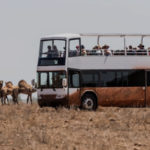 |
Station tour and demonstrations |
|
Learnings from what works for them. | https://youtu.be/iUaXwPwy-Yc |
| Beef producer | 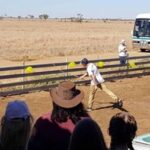 |
On-farm meals, workshops, school group visits, and tours
|
|
How it was to start in agritourism, support from the tourism industry (the video mentions Queensland tourism organisations). | https://youtu.be/f-c2c0nXpRU |
| Orchard (rosellas) | 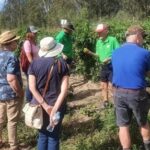 |
Roadside stall, farm tours, and on-farm festival
|
CC’s Kitchen and Petersen’s Farm
|
Includes why they host a festival, how they manage the risks of hosting guests on their farm, advice for others looking into agritourism, and the benefits the farmers have received from agritourism. | https://youtu.be/e3Dh5DTUkyE |
| Orchard (macadamias) | 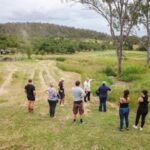 |
Events, workshops, on-farm café and retail shop
|
Baupal Park Farm | What visitors love about visiting a macadamia farm with café and events, changing an agricultural business model from wholesale to producing value-added products for sale directly to the public, advice around understanding Council’s expectations. | https://youtu.be/w2wFYp9wjac |
Each of the following case studies includes details on an agritourism business’
- competitive advantage
- growth journey and future growth plans
- business viability and benefits
- advice to other farmers looking to start an agritourism business.
| Farm type | Agritourism offering | Case Study | Business website | |
| Beef producer |  |
Camping and caravan sites | Banka Banka West Station and Tourist Park | www.bankabankawest.com.au |
| Beef producer |  |
Camping, caravan sites, cabins, events and tours | Tobermorey Station Roadhouse and Caravan Park | https://tobermoreystation.com.au/ experiences |
| Beef producer | 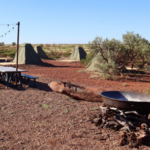 |
Camping, caravan sites, bed and breakfast, and café |
|
www.cheelaplains.com.au |
| Beef producer |  |
Camping, caravan sites, motel, and meals |
|
www.curtinsprings.com |
| Beef producer |  |
Luxury accommodation, observation of farm activities, tours |
|
www.bulloriver.com.au |
| Camel dairy and beauty products |  |
Farm gate, on-farm café, on-farm retail, farm tours, and meeting venue | Summer Land Camels | https://summerlandcamels.com.au/ pages/visit-us |
| Cropping |  |
Farm tours (cotton production through to fabric and fashion) | Goondiwindi Cotton | https://goondiwindicotton.com.au/ pages/farm-tours |
| Orchard (tropical fruit) |  |
On-farm retail sales, events, tours, and school groups | Tropiculture Australia |
The process of developing an agritourism experience
The following steps will help you understand the process of developing a new agritourism experience.
STEPS OF DEVELOPING A NEW AGRITOURISM EXPERIENCE
If you are new to business, Business.gov.au has a wealth of information and templates to help you start a business.

